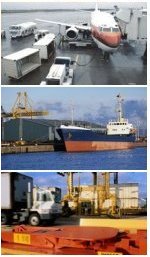

 |
 |
 |
Articles & Information<<Back to Articles/Information Index>> SHIPPING CLAIMS: DIFFICULTIES WITH ARGUING THAT THE CLAIM IS IN THE WRONG COURTThe recent decision Australian Federal Court decision of Heilbrunn v Lightwood PLC demonstrates that it is often difficult to persuade a Court to decline jurisdiction and not hear the case. This matter involved a claim for summary dismissal of the case by the defendant, Lightwood PLC. The Plaintiff was a person who arranged for the transportation to England and back of a number of cars for a car club that was participating in a car trial. When the subject car was on its return journey to Australia, it was damaged. The damage was caused by an employee of the defendant, that conducted a warehousing business, when that employee attempted to drive the car into a container. The container was to be transported by road from Tilbury to London before returning to Sydney by sea. As is customary, the defendant’s application was heard at a preliminary stage of the matter, and therefore, the Court assessed the evidence based on affidavits and documents exhibited, rather than on oral evidence. The defendant based its claim on three grounds. It firstly argued that the Federal Court did not have the authority to deal with the matter because the claim was not a general maritime claim under the Admiralty Act 1988 (Cth). (The Australian Federal Court is only responsible for adjudicating claims concerning Federal Legislation). The defendant further argued that even if the Court had jurisdiction, the terms of the transport documentation stipulated that the claim would be time-barred or that the exclusive forum for disputes would be the Courts of England. Allsop J rejected all of the defendant’s claims. His Honour found that the claim was in fact a maritime claim in accordance with section 4 of the Admiralty Act 1988 (Cth). In particular, the judge relied upon sub-section 4(3)(f) which provides that maritime claims include “a claim arising out of an agreement that relates to the carriage of goods or persons by a ship..”. The Court determined that the movement of the car resulting in damage was essential to the performance of sea carriage, even though it was not strictly part of the sea transportation. The Court also rejected the defendant’s other two grounds because it held there was insufficient evidence as to what contractual documentation (if any) may be binding on the Plaintiff. This argument was complicated by the fact that the warehouseman was contracted by a United Kingdom forwarder, who in turn was engaged by an Australian forwarder. There were potentially different sets of terms that may apply to the Plaintiff by reason of documentation issued by those and other parties. The key terms however were those existing between the UK forwarder and the defendant and the Court determined that there was insufficient proof as to what these terms were. Note also that the Plaintiff got around the privity of contract problem by pleading its claim in tort and bailment. In addition to demonstrating how Courts may deal with these jurisdictional issues, this case also shows the importance of having clear documentation in the international movement of goods. ROSS BECROFT |
|
|
Home |
Our Services |
Our People The information you obtain at this site is not, nor is it intended to be, legal advice.
Copyright ©2007 by Gross & Becroft lawyers . All rights
reserved. |